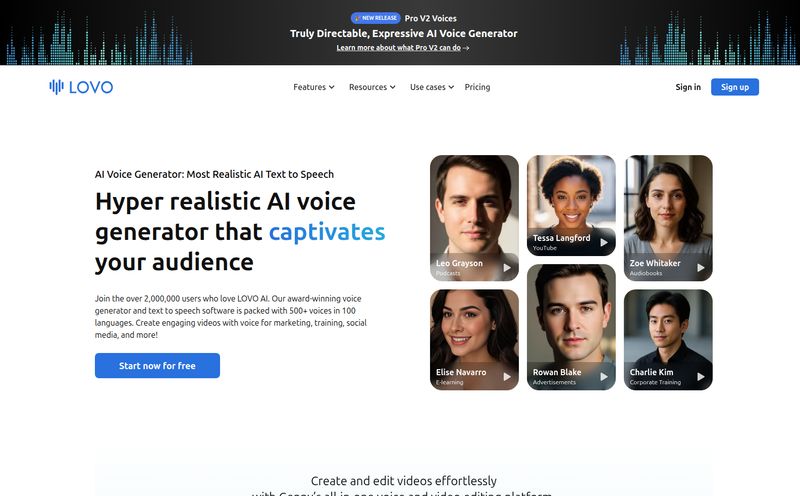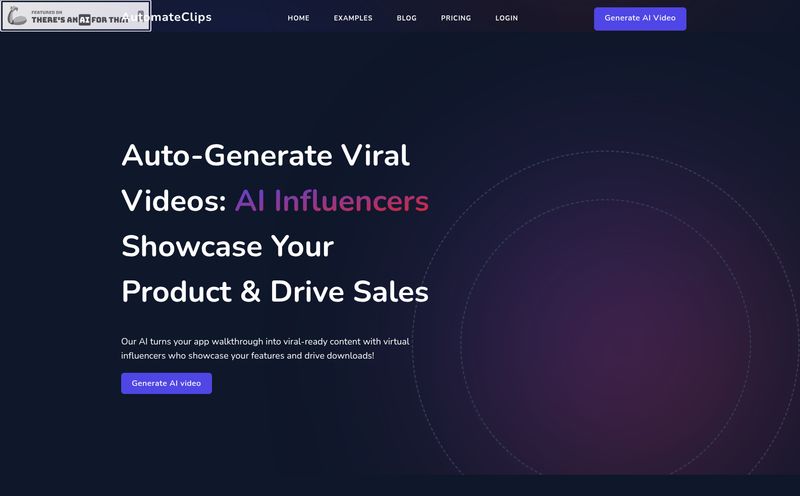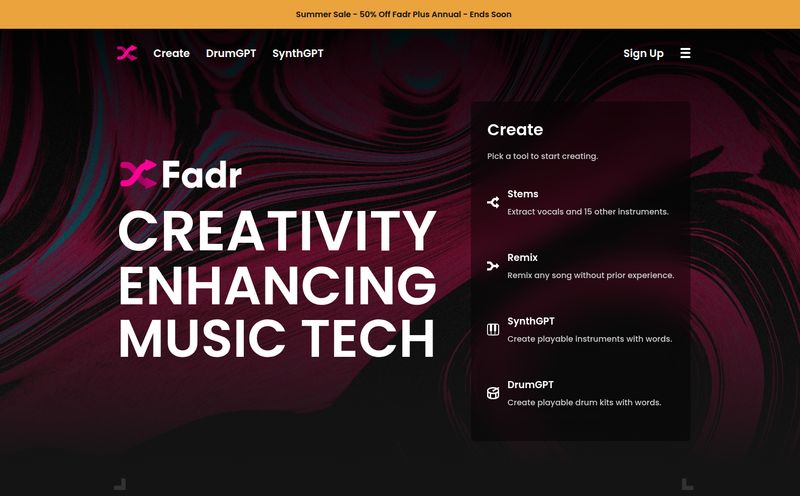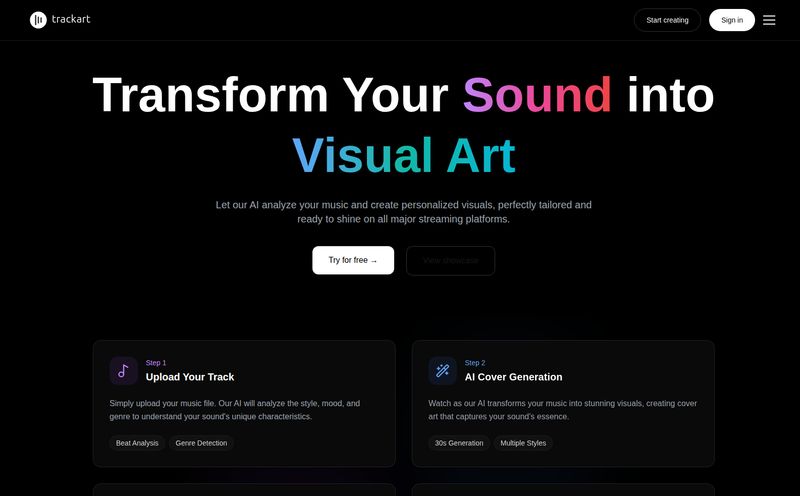The last couple of years in the creative space have been… a whirlwind. AI is everywhere, and if you're a musician, producer, or content creator, you've probably felt that weird mix of excitement and, let's be honest, a little bit of dread. We’ve all heard those robotic, soulless AI-generated vocals that sound like a satnav trying to sing a ballad. It's enough to make you want to unplug everything and go live in a cabin.
But every now and then, a tool comes along that feels different. A tool that feels less like a replacement for creativity and more like a genuinely new paintbrush. For me, that tool might just be Audimee. I’ve been playing around with it for a bit, and I have some thoughts. This isn't just another text-to-speech engine; it’s a full-on voice-to-voice platform, and the results are kinda startling.
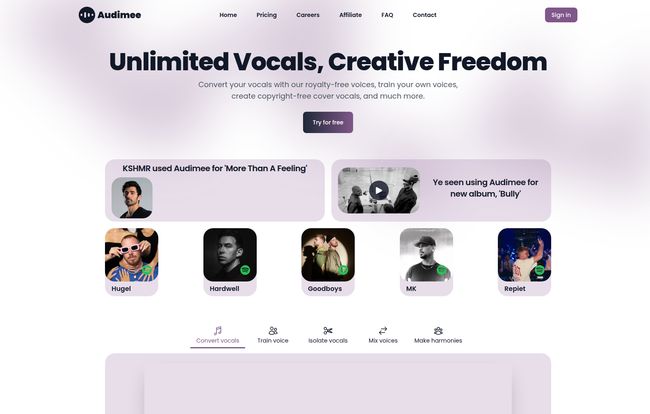
Visit Audimee
So, What is Audimee, Really?
Forget typing in lyrics and getting a computer voice back. Audimee works by taking an existing vocal track—yours, someone else's, it doesn't matter—and transforming it into a completely different voice. Think of it like a vocal chameleon. You provide the performance, the melody, the emotion, and Audimee swaps out the vocal cords.
The big deal here is the quality. The platform boasts “studio-quality models,” and from what I’ve heard, that’s not just marketing fluff. We're talking about voices that have texture, dynamics, and breath. The kind of stuff that usually gets lost in digital translation. What really caught my eye, though, was the promise of creating copyright-free cover vocals. In an age of endless YouTube copyright claims and takedowns, that single phrase is music to my ears.
Diving Into the Features
An AI tool is only as good as its features, right? A slick landing page is nice, but I need to know what’s under the hood. Audimee actually packs a surprising amount of punch.
Studio-Quality Voice Conversion
At its core, this is what Audimee does. You upload a vocal, and you can convert it using their library of royalty-free voices. And this library is pretty diverse. Looking at their site, you've got voices like Mark (a warm, folky singer-songwriter type), Nicole (a powerful pop/soul vibe), and a bunch of others. This is a massive advantage for producers who need a specific vocal color for a track but don’t have a roster of session singers on speed dial. It’s like having a team of vocalists on call 24/7, without the diva attitudes or the studio rental fees.
Your Voice, Your AI Model
This, for me, is the real game changer. Audimee allows you to train a custom voice model. You can upload samples of your own voice, and it will create a private AI version of you. The possibilities here are wild. Maybe you're a great songwriter but not a confident singer. You could sing a demo, then have your own, perfected AI voice perform the final take. Or you could preserve your vocal identity for future projects. It's a way to use AI without losing what makes you unique—a concept I can definitely get behind.
More Than Just a Voice Changer
This is where Audimee separates itself from the simpler tools. It’s not just a one-trick pony. It has a built-in Harmony Maker, which is frankly brilliant. Creating complex, realistic vocal harmonies is tedious work, even for experienced producers. This tool simplifies it massively. Add in a pitch editor for fine-tuning and a vocal isolator to strip vocals from a full track, and you've got a seriously useful production environment. Its a suite of tools, not just a single effect.
Who Is This Actually For?
I can see a few groups getting a ton of value out of this. Obviously, music producers are the prime audience. Being able to quickly mock up vocal ideas or even generate final, commercially usable vocals is huge. I saw that an artist like KSHMR has used it, which lends it some serious credibility in the electronic music world.
But it's not just for them. YouTubers and social media creators could use it to create unique jingles, theme songs, or copyright-free background music with vocals. Podcasters could create unique audio branding. It's a flexible tool for anyone working with audio who wants to add a professional vocal element without hiring a singer or risking a copyright strike.
Let's Talk Money: Audimee's Pricing Plans
Alright, the all-important question: what's it going to cost me? Audimee has a tiered system, which is pretty standard for SaaS platforms. I've broken it down here so you can see what you get for your money.
| Plan | Price | Key Features | Best For |
|---|---|---|---|
| Free | $0 | 15 mins of conversions, 9 royalty-free voices, Personal use only, .mp3 downloads, can't save. | Just trying it out, hobbyists. |
| Starter | $12 /month | 1 hour/mo, 1 custom voice slot, all voices, commercial use, .wav downloads. | Light commercial users, YouTubers. |
| Pro | $25 /month | 3 hours/mo, 3 custom voice slots, all features. | Serious creators, music producers. |
| Ultimate | $49 /month | Unlimited conversions, 8 custom voice slots. | Power users, small studios. |
The Free plan is generous enough to let you really test the waters, but its limitations (personal use only, no saving conversions) mean you'll have to upgrade for any serious work. For my money, the Pro plan at $25/month seems to be the sweet spot. Three hours of conversion time is a decent amount for regular projects, and getting three custom voice slots opens up a lot of creative avenues. The jump to .wav downloads on the paid plans is also critical for anyone doing pro audio work; you need that uncompressed quality.
The Good, The Bad, and The AI
No tool is perfect. After spending some time with Audimee, here's my honest breakdown.
What I really like is the sheer quality of the output and the focus on being royalty-free. That commercial-use license on the paid plans is a huge weight off a creator's shoulders. The custom voice training is also a standout feature that feels personal and powerful. The whole thing just feels thoughtfully designed for actual creatives, not just tech demos.
On the flip side, the main drawback is the conversion time limits on the lower-tier plans. An hour or three can go by pretty quickly when you're experimenting. You have to be a bit mindful of your usage, which can sometimes stifle that free-flowing creative process. Of course, the Ultimate plan solves this with unlimited conversions, but that's a bigger financial commitment.
My Final Take
So, is Audimee worth it? In my opinion, yes. It's a powerful, high-quality tool that sits at the intersection of creativity and technology. It solves a real problem for creators by providing access to professional, legally-safe vocals. It's not a magic button that will write a hit song for you—you still need to bring the ideas, the melodies, and the performance. But it is an incredible new instrument to add to your toolkit.
It feels like a step in the right direction for AI in music—one that empowers artists instead of trying to replace them. And in this crazy, fast-changing industry, that’s a very welcome tune to hear.
Frequently Asked Questions
What exactly is conversion time?
Conversion time is the total duration of audio you can process through the voice models each month. For example, if you convert a 3-minute song, you've used 3 minutes of your monthly allowance.
Can I really use the voices for commercial projects?
Yes! On any of the paid plans (Starter, Pro, Ultimate), you get a commercial license to use the royalty-free voices in your music, videos, or other projects. The Free plan is for personal use only.
What are custom voice models?
This feature lets you train Audimee's AI on your own voice. You upload clean recordings of your singing, and the platform creates a unique voice model that sounds like you, which you can then use for conversions. It's private to your account.
What happens if I cancel my subscription?
According to their FAQ, you can continue to use the vocals you created and downloaded during your active subscription period for commercial purposes. However, you'll lose access to the platform's features and won't be able to create new conversions once the billing period ends.
Can it convert vocals in languages other than English?
The platform is primarily optimized for English, but they state it can work with other languages. The quality might vary, so it's best to test it on the Free plan first if you're working with non-English vocals.
What's the difference between .mp3 and .wav downloads?
MP3 is a compressed audio format, which means some audio data is lost to make the file size smaller. WAV is an uncompressed, high-fidelity format that's standard for professional music production. The paid plans offer WAV downloads, which is essential for quality.
